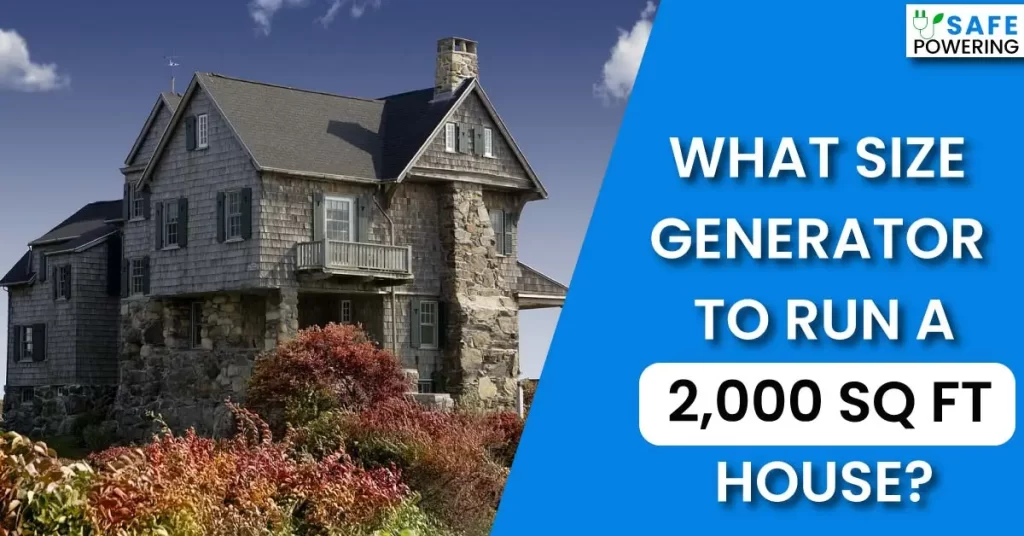What Size Generator to Run a 2000 Sq Ft House?
This article is all about answering your burning questions about “What Size Generator To Run A 2000 Sq Ft House?”, what factor should we consider before buying it and how can we calculate the actual power needs?
An 8 – 10Kw generator would be enough for a 2,000 Sq Ft House with a bunch of Basic appliances like a refrigerator, Microwave, Air conditioner, LED bulbs, TVs, Blender, Electric Stove, Chargers, Toaster, etc. However, if you are going to operate some heavy-duty appliances like Central air conditioners, Dryers, Electric water heaters, etc. you should do the wattage calculation before making a buying decision.

What Size Generator to Run a 2000 Sq Ft House?
As a general thumb rule an 8 – 10kw generator would be enough for a 2000 sq ft. house, however, we encourage our users to calculate their wattage needs first.
Before calculating the power requirement we should know the purpose of Starting and Running wattages.
Surge/Starting Watts: Maximum watts a generator could produce for a short time to just fire up heavy-duty motorized/compressor-based appliances like Sump pumps, Air conditioners, Well Pumps, etc.
Starting wattages will always be higher compared to running watts.
Running/Rated Watts: Maximum wattages a generator could produce for a longer time to run the appliances in a stable condition.
Calculate the Wattage Requirements:
- List the all appliances of your house with their starting/surge and running/rated watts. You can find the actual wattage rating of the appliances by reading their nameplate/energy labeling.
- If you have found the power rating in Amps and you are not comfortable with the calculation make sure to convert it by using the Ohms law.
Ohm’s Law: W (watts or kilowatts) = Amps (Amperes) X Volts (V)
For E.g.: An appliance is consuming 10 running/rated and 12 starting/surge amps at the voltage of 120V.
W (watts or kilowatts) = Amps (Amperes) X Volts (V)
Running watts = 10×120 = 1200W
Starting watts = 12×120 = 1440W
- Sum up the starting and running watts of all appliances and keep them in a separate column.
- Compare the calculated wattage of the appliances and compare it with the generator you are going to choose.
NOTE: Wattage rating will not only help to find the desired machine but also save your initial and ongoing cost of fuel and maintenance.
Recommended Read: What size generator do I need to run a house?
What to Consider When Buying a Generator for a 2,000 Sq Ft House
Desired power Output:
The selected generator must have sufficient starting and running watts to operate the desired appliances smoothly. We recommend doing the wattage calculation first by following this section of the article.
Steady Voltage with Lower THDs:
The selected machine should provide steady voltage with the lowest possible THD (total harmonic distortion) level (<%5 is preferable).
A generator with higher THD levels will not only impact the performance of the appliances and equipment but also can destroy them as well.
Noise Levels:
Noise pollution isn’t only irritating for the owners but also for the neighbors as well. The selected generator must be neighboring-friendly with minimum noise levels.
We recommend selecting a machine that emits between 60 to 62 dB(A) on average at 25% load.
NOTE:
- Noise is highly dependent on the load and distance of the generator from the house, with an increased load you may have to slightly compromise on the noise levels.
- Don’t ever select a generator that emits more than 80 dB(A) at 25% load.
Durability, Warranty, and Customer Support:
Like Honda, NorthStar, and other renowned brands, the selected machine should be built from a high-grade non-corrosive material that should last at least a decade.
In addition to that it should have at least 3 years of warranty backed by decent customer support as well.
Runtime:
Runtime is one the crucial factor that shouldn’t be neglected while purchasing a new generator, as per my tests an efficient brandable generator should at least provide 7.5 – 9 hours of runtime at 30 – 40% load with a single fuel tank.
NOTE: Runtime mainly depends on the load, fuel tank size, and the technology of the generator, with increased load you may have to compromise on the fuel, also if the generator has a small fuel tank you have to refill it again and again.
Moreover, if the generator has inverter technology it may consume a bit less as the inverter machines have ECO mode or other RPM regulating devices that make sure the generator should consume the fuel as per the needs.
Fuel Option:
We recommend selecting a Tri Fuel (LPG, GASOLINE, NATURAL GAS) or at least Dual Fuel (LPG, GASOLINE) machine so that you will always have option “B” or “C” if you run out the gasoline.
Again it depends on the cost and availability of the fuel, if you can easily avail the gasoline at feasible rates you don’t have to spend more on the dual or tri-fuel machines.
Portability and Mobility:
Portability can be Compromised unless you need to take the generator to camping, tailgating, or outdoor parties, however, mobility can’t be neglected at any cost.
The machine should have at least a decent mobility kit with a carrying handle and a pair of non-flat tries to move it around easily.
Brand:
Before making a buying decision makes sure to read the reviews and credibility of the brand, if your budget is high we recommend considering a Made in USA generator over Chinese-made machines.
As per my experience of more than 5 years, Generac, NorthStar, Briggs and Stratton, and Friman are the toughest and most efficient brands in the USA.
Safety Features:
Go for the machine that should have certification from the EPA and CARB. Additionally, the generator should have modern safety features like low oil protection, Overload protection, CO sensors, etc.
Recommended Read: What Size Generator To Run A 1500 Sq Ft House?
Recommended Best Generators for 2000 Sq Ft House?
| No | Generator Model | Starting and Running Watts | Fuel Type | Noise at High Load | Fuel Tank | Best For | Price |
|---|---|---|---|---|---|---|---|
| 1 | DuroMax XP12000HX Dual Fuel Portable Generator | 12,000/9500 | Dual fuel | 75 to 76 dB(A) | 8.3 Gallons | Normal Usage | Check Price |
| 2 | Champion Power Equipment 100891 | 9375/7500 | Dual fuel | 74 dB(A) | 7.7 Gallons | Normal Usage | Check Price |
| 3 | WGen12000DF | 15000/12000 | Dual fuel | 74 to 76 dB(A) | 10.5 Gallons | High Usage | Check Price |
| 4 | Generac 7043 Home Standby Generator | 22kW/19.5kW | Propane/Natural Gas | 67 – 68 dB(A) | Nil | High Usage | Check Price |
Recommended Read: What size generator do I need for a 400 amp service?
Final Words
Though an 8 – 10kw generator would be enough for a 2,000 square feet house, still we recommend calculating your wattage ratings first to make sure the generator you are looking for is perfectly sized and will never under power.
Frequently Asked Questions – [FAQs]
How Much Is a Generator for a 2000 Sq Ft House?
The cost of the generator varies as per the size, features, and brand of the generator, typically a solid generator from a reputable brand costs between $1500 to $5000 or even more if you are looking for a mighty 22 – 30Kw machine.
How Many Watts/Kw Does It Take to Run a 2000 Sq Ft House?
It depends on the usage and Number of appliances a house consists of if a house has basic appliances like microwaves, TVs, chargers, Laptops, refrigerators, normal air conditioners, etc. 7 – 8kw would be the average watt consumption.
On the other hand, if the house consists of heavy-duty appliances like a central air conditioner, heavy-duty sump pumps, Central heatings, electric water heaters, dryers, etc. the average wattage consumption would be 12 – 15kw.

Kashif has been a valuable asset to the electric generator industry for over 5 years. Now, As a skilled energy engineer, he’s been on the front lines of diagnosing problems, fixing broken parts, and performing routine maintenance tasks to keep generators running smoothly.
